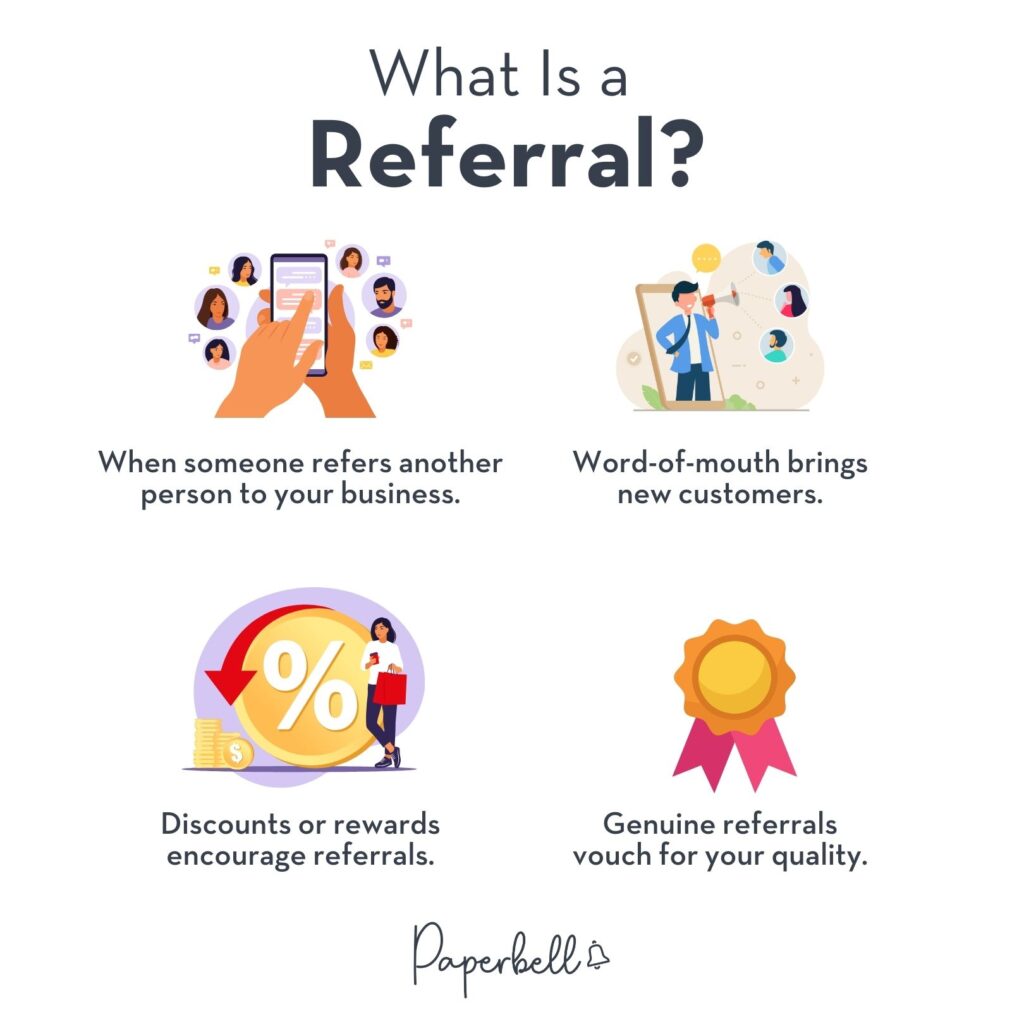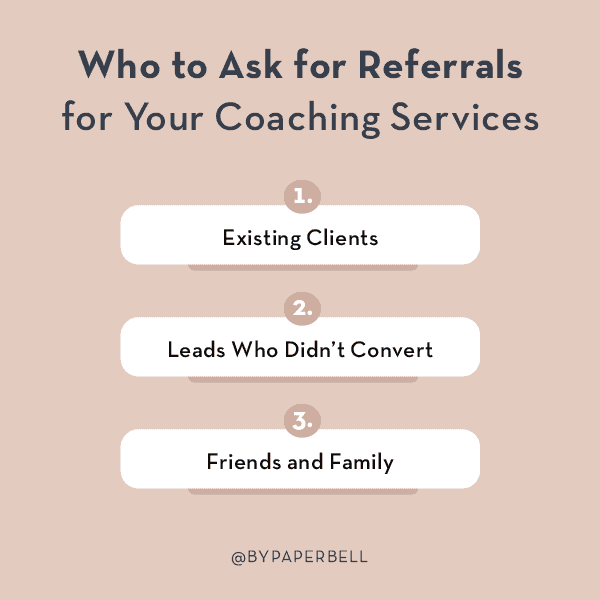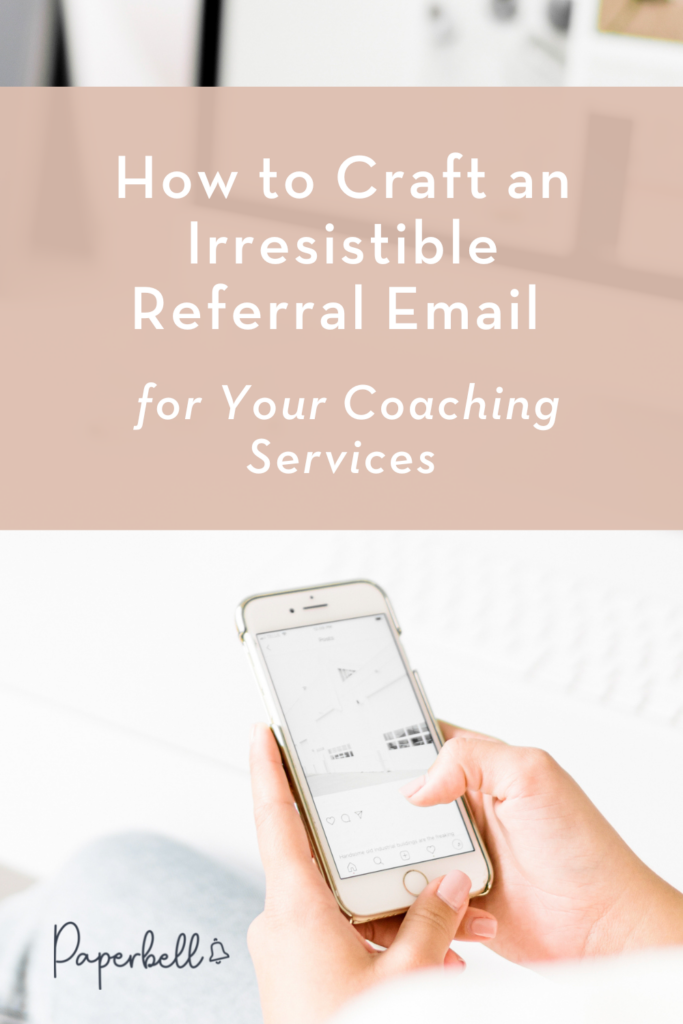If you’ve started your life coaching business and have at least one client, you have the spark to generate a supply of new clients.
We’re talking about referrals!
When used strategically, a referral program can help you start a flywheel that propels your coaching business forward at no extra cost. Using your existing customers to find new ones is one of the best ways to find new business.
Keep reading to learn who and how to ask for a referral.
What Is a Referral?

A referral is when someone refers another person to your business. They reach out to someone in their network who could be a good fit for your programs and services and put you in touch.
If you’ve ever known a service provider in your local area who gets all their customers from word-of-mouth, that’s referral marketing in action.
Many businesses encourage referrals by offering an incentive to those who recommend new customers or clients. For example, a discount or other reward for recommending the business through email, social media, or word of mouth.
Larger businesses sometimes offer their customers a referral link for easier tracking. If anyone signs up through that link, both the old and new customers get a discount on future services.
However, the most trustworthy referrals are those that aren’t incentivized and come from someone who genuinely recommends your work. People who refer you because they had a great experience with you are vouching for your coaching quality, reliability, and expertise.
Why Are Referrals Important for Life Coaches?
Referrals are one of the easiest ways to get coaching clients. They provide potential new customers with social proof that your methods work and that booking with you is worth their time.
They don’t just need to take your word for it but can listen to the experiences of happy customers who worked with you in the past.
All life coaches should implement referrals into their marketing strategy, regardless of experience, and here’s why.
1. Referrals Cost You Nothing
Leads you get from paid ads are expensive. Leads you get from organic social media marketing cost you time.
But the leads you get from referrals cost you nothing. It takes just a few minutes of your time to send a referral request email to an existing client to ask if they know anyone who may need your coaching services.
2. The Sales Process is Faster
Normally, a cold lead might take weeks or months to become a paying client.
They discover you on social media, check out a few of your posts, and maybe give you a follow. Then, if you turn up on their feed often, they might eventually decide to book a discovery call with you.
This process is long because—surprise, surprise—it takes a while to get to know someone! And if you’re going to pay someone to coach you, it’s important to have a foundation of trust.
People who come to you through referrals don’t know you. However, they do know that you’ve helped someone they know. This makes it much easier to build a relationship with them.
3. Higher Trust Leads to Higher Conversions
People tend to trust what their friends tell them. So when a client refers someone to you, that person is more likely to trust you compared to a complete stranger, even if your coaching rates are on the high side.
Their friend has already vouched for you and might have gushed about the amazing results you’ve helped them achieve.
At this point, they’re practically sold!
That’s why referrals generate conversion rates that are 3-5 times higher than other marketing strategies. Those clients also have 37% higher retention rates and are four times more likely to refer more clients to you. They are far more likely to trust a recommendation from someone they know than the reviews from strangers on your website.
Imagine if you could get every single client to send a referral your way. You would hardly need to market yourself in other ways.
4. Referral Clients Are More Loyal
On average, 78% of people say that clients who come from referrals are more loyal than those they acquire through other channels. So not only is it easier to close them, but you’re likely to nurture a longer and better coaching relationship with them.
5. Referrals Expose Your Business to Your Target Audience
Why do your existing clients bring you the best referrals? Because they are sharing your services with a very targeted audience. Referred clients typically come from people with similar interests, backgrounds, or needs as the person who recommended them.
6. Referrals Expand Your Network
When you ask people to refer your coaching business, it helps expose you to a wider network of people.
Those who refer you may be well-connected in other industries and can introduce you to new opportunities, collaborations, or partnerships. This opens new doors to a wider pool of potential clients and professional connections.
7. Referrals Help Your Long-Term Business Growth
To create longevity for your coaching business, you must figure out how to get a steady stream of clients.
Using a referral program to grow your network can future-proof your client acquisition efforts. If you have enough people who refer you to their network, you’ll have a long waitlist of people who want to work with you in the future.
The organic growth that referrals can create can help you build a sustainable coaching business that has a long future.
8. Referrals Build Your Reputation
Gaining credibility in the life coaching industry can be difficult, especially with so much competition out there.
When you have lots of referrals, you build trust amongst future clients and prove that the services you provide are exceptional. When you consistently deliver great results, it will be a no-brainer that clients refer you to their friends and family.
Who Should Coaches Ask for Referrals?
If you want to use referrals successfully, you will need to get good at maintaining relationships with existing customers, build a strong network of like-minded people, and consistently deliver excellence with your coaching programs.
With a community of fellow coaches or coachees around you, asking for referrals should be a breeze. Remember, you can always reciprocate the favor for them.

Below are the best places to look if you want to generate referrals for your life coaching services.
1. Existing Clients
Satisfied clients you currently work with are the most obvious choice.
If they have experienced positive results from your coaching, they are likely to vouch for you. They’re also ideal candidates to ask for a testimonial.
Sending them a personalized email asking if they know anyone who could benefit from your coaching services is the perfect place to start.
2. Leads Who Didn’t Convert
Don’t get discouraged if you get on the phone with a potential coaching client and they’re not ready to work with you. That person may not be financially or emotionally ready to commit yet, even if they trust you. Or you may not have the exact coaching style that suits them.
That doesn’t mean they don’t know someone else who could benefit from your coaching. If you get a good vibe from the call, feel free to follow up in an email to ask if anyone knows anyone who would benefit from your coaching packages.
It might feel intimidating to ask a favor from someone who has turned you down. But stepping out of your comfort zone from time to time is necessary to build a thriving life coaching business.
3. Friends and Family
Your relatives and close friends have friends you don’t know. And those friends have other friends.
While your current circle may not be the best fit for your coaching packages (or they might be too close to home), they may know someone you could work with.
4. Your Professional Connections
If you already have a strong network of professional contacts, reaching out to them for referrals can be an effective way to expand your customer base.
All it takes is a compelling email explaining the type of clients you’re looking for.
5. Your Partners or Collaborators
Do you have any partnerships with other coaches? Have you collaborated with others in your niche to help get your name out there? They could be the perfect people to request referrals from.
You could suggest a referral exchange where you refer new clients to each other. Send out a mutually beneficial email asking for referrals to both of your mailing lists.
How to Ask For Referrals in an Email: 5 Things to Remember
Here are some important things to remember when asking your network for a referral via email.
1. Wait Until You’ve Established Rapport
Imagine you’re someone who wants to hire a coach. As soon as you sign the contract and make the first payment, you get asked to refer someone else.
Woah, back up a sec!
It’s better to wait until you have more rapport with your coaching client. It’s difficult to refer someone when you’ve just paid for their services. At that point, the ball is in your court; they’ve put their trust in you, and you must return the favor by providing a stellar coaching experience.
Once they’ve begun to get some traction, you can start thinking about making that ask.
2. Choose a Good Time
At this point, you should be getting to know your client fairly well. You might even know what time of day they’re more likely to be checking their emails.
Make sure you message them at the right time to avoid other emails burying yours in the inbox.
3. Offer an Incentive
If you’re not sure someone will take you up on your referral email, make them a better offer! You can do this by giving an incentive if they refer someone to you who’s a good fit.
Over 50% of people are likely to give a referral if they receive an incentive, social recognition, or access to a loyalty program. Some examples of incentives could be:
- A commission if you close the sale with the person they refer
- A discount from the next coaching session or package they book
- A free coaching session
- Access to a resource that you’d normally sell
- Some merchandise or a free gift, such as a copy of your favorite book
Make your incentive conditional on closing the sale. This will encourage people to refer a high-quality lead to you instead of sending you everyone they know.
4. Keep Your Referral Email Short and Sweet
Your referral email should have a single purpose: asking for a referral.
This means you shouldn’t ask for a referral while you’re also sending your client some homework or any other business communication. This can cause them to get distracted and forget about the favor you asked for.
Instead, send an email that’s specifically focused on the referral. Don’t make it too long; stay on message and be specific.
5. Practice What You Preach
If you want to receive referrals for your coaching business, get into the habit of giving referrals.
You don’t have to give referrals specifically to the same client you’re asking. But by putting the right energy out there, you’ll invite others to do the same.
For instance, let’s say a website designer created your coaching website. If you’re happy with their work, make sure to send other coaches you know in their direction. This designer will be more likely to think of you if they get a client that would be a good fit for your coaching services.
Referral opportunities are always out there, and by giving others recommendations, you could increase your chance of receiving new customers.
7 Easy Steps for Writing a Great Referral Email
When you write a referral email, there are a few basic principles to keep in mind. Here are 11 steps to writing a winning referral email template that you can use time and time again (with a little customization, of course).
1. Don’t Skip the Subject Line
The subject line needs to be the most compelling part of your email to make it stand out in your client’s inbox.
If you simply write “referral request,” it may not sound interesting enough to warrant an opening. You want the subject line to be compelling and intriguing. For example, a question like “Can I ask you something?”
2. Start With a Warm Greeting
You aren’t writing a formal business letter; you know this person! Connect with them by writing a warm opening line. You want to create a positive tone right from the start.
Whether you mention a recent coaching session or something you know about your client’s personal life, be sure to make the message friendly.
3. Personalize the Message
Sending out a mass referral email won’t garner the response you want. Make your email personal if you want to get as many referrals as possible.
Of course, using a referral template email is absolutely fine; you’ll just need to make some edits to make it personal for each individual you send it to. Adding a human touch will make the email much more engaging.
4. Highlight the Benefits
What’s in it for them? Make the benefits of referring someone clear from the offset. Here’s an example: Refer a friend and get 50% off your next coaching session.
If there are multiple, use numbers or bullet points so the benefits stand out in the body of the email.
5. Keep it Concise and Engaging
Nobody has time to read a long-winded email requesting referrals. So keep it short and get straight to the point. A few short, easy-to-skim lines with a clear call to action are all you need.
6. Show Gratitude
Thank your client for taking the time to read your email, and thank them in advance for referring your business to others. Showing how much their referral means to you boosts the chance they will take action.
7. Don’t Forget to Follow Up
If you don’t hear anything back, it’s perfectly fine to follow up. One or two gentle spaced-out reminders can do the trick.
Referral Email Templates for Coaches
Struggling to write your referral email? Just copy and paste these templates and tweak them as you see fit.
1. Asking Clients for Referrals
Hi [Name],
I’m thrilled with the progress we’ve made together, and I hope you are too! If you know someone who could benefit from my coaching services the way you have, I’d love the opportunity to help them as well.
Feel free to pass along my details or let me know if there’s anyone you think I should reach out to.
Thank you so much for your support!
Best,
[Your Name]
2. Asking Professional Contacts for Referrals
Hi [Name],
I hope you’re doing well! I’m currently working with clients to [mention a key benefit/result you provide] and I’m reaching out to see if you know anyone in your network who might be interested in this.
If someone comes to mind, I’d love an introduction or for you to pass along my information.
Thanks for considering it—I truly appreciate your help!
Best regards,
[Your Name]
3. Asking Other Coaches for Referrals
Hi [Name],
I’ve been thinking about how we could both support our clients better. Since we have different coaching specialties, I believe there may be opportunities to refer clients to each other when their needs fall outside of our core focus areas.
I’d love to discuss setting up a referral exchange, so we can both help more people achieve their goals while growing our practices. Let me know if you’re open to exploring this idea!
Looking forward to hearing from you.
Best,
[Your Name]
Start Growing Your Coaching Business
Referrals can be a powerful way to grow your coaching business with clients who are a perfect fit. By confidently asking for referrals, you can build a strong network through trusted recommendations.
And while you’re growing your business, let Paperbell take care of the rest.
From creating a stunning coaching website in a few clicks to managing client scheduling, payments, and communication, Paperbell makes it all simple. Get started today for free with your first client.

Editor’s Note: This post was originally published in July 2023 and has since been updated for accuracy.









